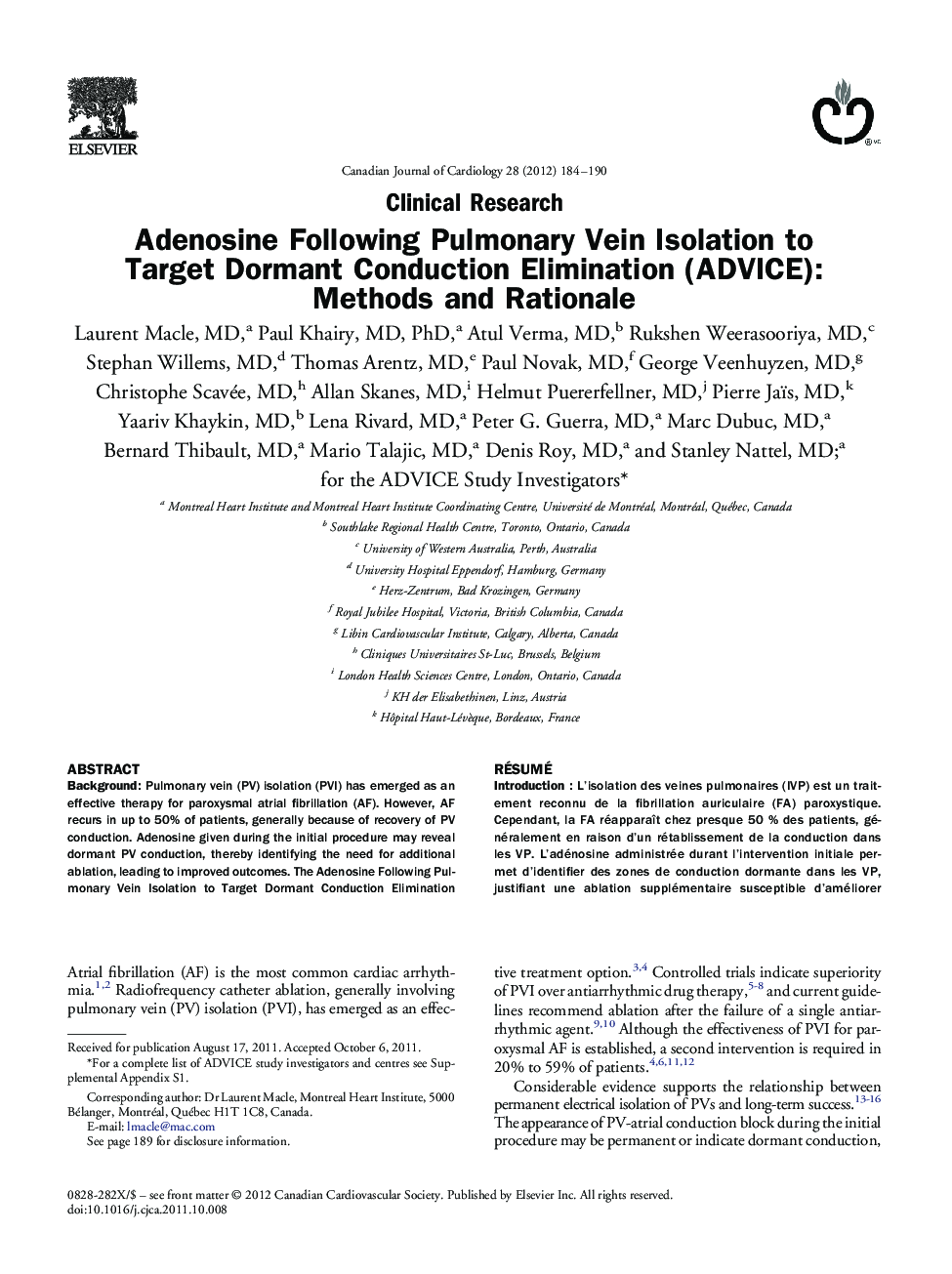| کد مقاله | کد نشریه | سال انتشار | مقاله انگلیسی | نسخه تمام متن |
|---|---|---|---|---|
| 2732085 | 1566537 | 2012 | 7 صفحه PDF | دانلود رایگان |

BackgroundPulmonary vein (PV) isolation (PVI) has emerged as an effective therapy for paroxysmal atrial fibrillation (AF). However, AF recurs in up to 50% of patients, generally because of recovery of PV conduction. Adenosine given during the initial procedure may reveal dormant PV conduction, thereby identifying the need for additional ablation, leading to improved outcomes. The Adenosine Following Pulmonary Vein Isolation to Target Dormant Conduction Elimination (ADVICE) study is a prospective multicentre randomized trial assessing the impact of adenosine-guided PVI in preventing AF recurrences.MethodsPatients undergoing a first PVI procedure for paroxysmal AF will be recruited. After standard PVI is completed, all patients will receive intravenous adenosine in an attempt to unmask dormant conduction. If dormant conduction is elicited, patients will be randomized to no further ablation (control group) or additional adenosine-guided ablation until dormant conduction is abolished. If no dormant conduction is revealed, randomly selected patients will be followed in a registry. The primary outcome is time to first documented symptomatic AF recurrence. Assuming that dormant conduction is present in 50% of patients post PVI and symptomatic AF recurs in 45% of controls, 244 patients with dormant conduction will be required to obtain > 90% power to detect a difference of 20%. Thus, a total of 488 patients will be enrolled and followed for 12 months.ConclusionThe ADVICE trial will assess whether a PVI strategy incorporating elimination of dormant conduction unmasked by intravenous adenosine will decrease the rate of recurrent symptomatic AF compared with standard PVI.
RésuméIntroductionL'isolation des veines pulmonaires (IVP) est un traitement reconnu de la fibrillation auriculaire (FA) paroxystique. Cependant, la FA réapparaît chez presque 50 % des patients, généralement en raison d'un rétablissement de la conduction dans les VP. L'adénosine administrée durant l'intervention initiale permet d'identifier des zones de conduction dormante dans les VP, justifiant une ablation supplémentaire susceptible d'améliorer l'efficacité du traitement. ADVICE (Adenosine Following Pulmonary Vein Isolation to Target Dormant Conduction Elimination) est une étude prospective multicentrique visant à évaluer l'efficacité de l'IVP guidée par l'adénosine pour le traitement de la FA.MéthodesL'étude portera sur des patients atteints de FA paroxystique, référés pour ablation par cathéter. À la suite d'une IVP standard, l'adénosine est administrée par voie intraveineuse pour identifier la présence de conduction dormante dans les VP. En présence de conduction dormante, le patient est assigné de manière aléatoire à l'un des 2 groupes suivants: aucune ablation supplémentaire (groupe témoin) ou ablation supplémentaire guidée par l'adénosine jusqu'à l'abolition de la conduction dormante. En l'absence de conduction dormante, un groupe est également constitué pour faire l'objet d'un suivi. Le critère d'évaluation principal est la récidive de FA symptomatique. En supposant une prévalence de conduction dormante de 50 % et la récidive de FA chez 45 % des patients du groupe témoin, 244 patients avec conduction dormante seront requis pour la validation statistique des résultats. L'étude devra donc inclure 488 patients et le suivi sera d'une durée de 12 mois.ConclusionL'étude ADVICE permettra de déterminer si la stratégie d'IVP guidée par l'adénosine est supérieure à l'IVP standard pour prévenir la récidive de FA.
Journal: Canadian Journal of Cardiology - Volume 28, Issue 2, March–April 2012, Pages 184–190